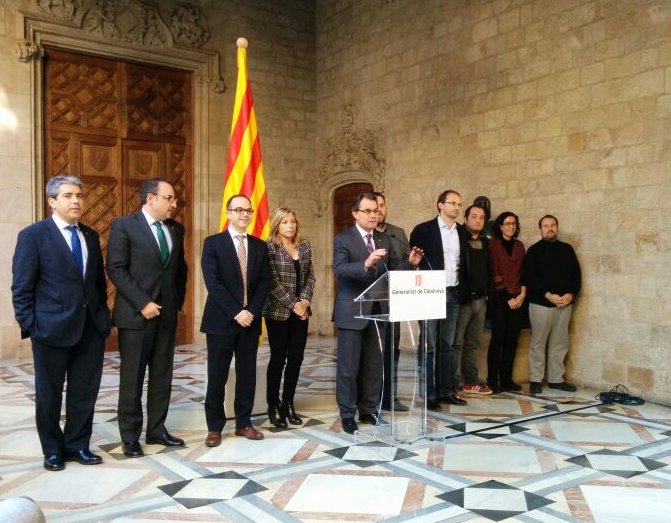12.12.2013 - 17:23
Do you want Catalonia to become a state? If yes, do you want this state to be independent?” These are the two referendum questions that the political parties supporting Catalonia’s self-determination vote have agreed to. CiU (Liberal Democrats and Christian Democrats), Republican Left, ICV-EUiA (Greens and former communists) and CUP (anti-capitalist left) also agreed to hold the vote on November 9, 2014, “giving Spanish institutions time to negotiate with Catalan institutions within the legal frameworks”.
The agreement was announced by Mr Artur Mas, President of the Catalan Government, in a solemn appearance at Government Palace. Mr Mas, head of the CiU, was joined by the leaders of the other parliamentary groups supporting the vote. The question is “a compromise”, said Mr Mas, “as it allows voting for a change of the status quo and also allows for a vote on independence”.
The parliamentary groups that signed the agreement represent 64.5% of the Catalan Parliament’s seats. The agreement is conditional on ratification by each of the supporting parties’ executive committees.
The Spanish government has vowed to block any such referendum. Spain’s justice minister, Mr Alberto Ruiz-Gallardón, immediately said the vote could not take place because the Spanish constitution does not allow it.
After weeks of debate and speculation, the parties supporting Catalonia’s right to self-determination and of the organisation of a vote on this issue have finally reached an agreement on the wording of the question and the date of the referendum. The parties had set as a deadline the end of December for reaching an agreement, however political tension prompted them to speed up the process.
This week the parties in favour of self determination held a series of discreet meetings in which Mr Mas was personally involved in the negotiations. During the announcement Mr Mas briefly explained that the last round of negotiations had been “quick”, over the course of “just two days” and developed with much “discretion”.
According to the Catalan President, the agreement is a “very good” one, as it covers the two main objectives the parties had set for themselves. Firstly, the question is “very inclusive” and is backed by “a wide majority”. Secondly, it is “a clear question”, which can be answered by ‘yes’ or ‘no’. Mr Mas explained that in order to meet these two conditions, the question has to be split into two parts. In addition, Mr Mas also said that they had also agreed on a specific date to hold the vote.
At this point, Mr Mas announced the question: “Do you want Catalonia to become a state, yes or no? If yes, do you want this state to be independent, yes or no?” With this two-part question, those who want to vote for Catalonia’s independence can do so, but those who only want to vote on changing the current status quo can also voice their opinion, he explained.
Mr Mas, also said he wished that the Catalan Socialist Party (PSC) had also joined the agreement. The PSC supports Catalonia’s right to self-determination but is opposed to independence. A month ago it decided to withdraw from the negotiations on the wording of the question and the date of the vote, under pressure by the Spanish Socialist Party (PSOE), with which it is affiliated. If the PSC had joined the agreement, the self-determination vote would have been backed by 79.3% of the Catalan Parliament. The People’s Party (PP) – running the Spanish Government – and the anti-Catalan nationalist party Ciutadans (C’s) are absolutely opposed to holding such a vote and refused to be involved in the negotiations. These two Spanish nationalist parties represent 20.7% of the Catalan Parliament.
After explaining what the referendum question would be, Mr Mas then announced that the parties had agreed to hold the vote on the 9th of November 2014. He underlined that many groups and parties were publicly “engaged in organising such a vote in 2014”. Mr Mas explained that they had chosen the month of November “because it was the most convenient time for the success of the democratic process”. This way, “there will be time for the Spanish institutions to negotiate with the Catalan institutions within the legal frameworks, which are numerous”. Mr Mas also added the parties had agreed on the legal procedure for holding the vote, but that this would be announced later in the Catalan Parliament.
“Now we will wait for the answer of the Spanish State”, Mr Mas emphasised. He explained the many different ways that Catalans had expressed their will to freely and democratically vote on this issue. He expected Spanish institutions “to listen to the democratic will of their citizens” in Catalonia.
Finally, the Catalan President thanked the parties supporting the agreement for the “spirit of cooperation” and “their commitment to the country”. “We know what we have in our hands”, “we know it has a great historical transcendence and particularly a transcendence of the future” he concluded.



